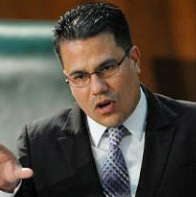(Jamaica Gleaner) Decades of terrible fiscal policies, which have pushed Jamaica’s debt burden to unbearable levels, have forced the country to seek alternative assistance, and set the platform for nations like China to partner with the island for mutual benefit, Senator Matthew Samuda has said.
These partnerships have been the alternative to traditional lending institutions like the International Monetary Fund, he said.
“Jamaica has only two ways it can finance development at this stage,” Samuda said. “The only way Jamaica can develop itself now to trigger growth is through partnership, because you can’t afford to borrow anymore. These partnerships mean giving and taking. If you are going to give somebody US$100 million worth of work, it is expected they’re going to seek US$100 million, plus whatever interest and margin they seek … or by way of whatever concession or whatever it is they are looking for,” he told The Gleaner on Tuesday.

China is now under the microscope for its dominance in the local construction sector. Local contractors have been complaining bitterly that the big infrastructure contracts are being awarded to Chinese companies. They recently received endorsement from Prime Minister Andrew Holness, who stressed that partnerships with the Chinese were beneficial to Jamaica.
Opposition Spokesperson on National Security Peter Bunting last week suggested that concerns stretched far and wide, that Jamaica was undergoing a form of economic colonialism by Chinese operating in Jamaica. The Embassy of the People’s Republic of China in Kingston has since dismissed Bunting’s claims, labelling the allegations offensive and false.
Samuda, a government senator, stressed that foreigners flying their flags high on any project in Jamaica was nothing to be happy or excited about, but based on the current position of the economy, Jamaica needed help.
He cited the 0.7 per cent contribution made to the gross domestic product (GDP) by the construction sector last year as awful, demonstrating that Jamaica had not been able to survive on its own in that area, hence the need for Chinese intervention.
‘Why isn’t the cry that foreigners are taking over telecoms industry?’
“You are not supposed to be excited when you see a foreign flag flying on any project on local soil,” said Samuda. “But we have to admit to ourselves that where we are in our economy is a far way from financial independence. Certainly, we fell in that space in the ‘70s and climbed our way out partially in the ‘80s, but fell back down in the ‘90s.
If you look at the Caribbean Policy Research Institute study done in 2008, 71 per cent of the debt in 2008 had been created between 1996 and 2003. It took you to a debt level of 145 per cent per GDP. For the average man in Jamaica, that means if you make $100,000, you now owe $145,000. That is a disaster. Majority of Jamaica’s debt is held by Jamaican businesses. You have a portion that is held by lending agencies and you have few inter-governmental arrangements like the Government of China. So, China is not here taking over,” Samuda said.
“Construction last year (2016) in Jamaica, as per STATIN (Statistical Institute of Jamaica), was (0.7 per cent) of our economy. No country that has moved from developing to developed has done so with that low percentage of GDP being represented by construction. Jamaica has a 12.2 per cent unemployment rate. If you really want to dent that problem, you have to grow sectors like (construction and agriculture).”
Samuda called for a balance in complaints, stressing that when it comes to foreigners dominating other sectors, similar wide-scale debate does not occur.
“Industry-wise, why is the cry not there that foreigners are taking over our telecoms industry, because we don’t own one? It is only in foreign hands, in terms of the two players, Digicel and Flow. What about the sugar industry, which has saved Jamaica significant amount of costs each month? We are in a globalised environment, and people are going to invest in line with businesses worldwide that suits their commercial interest,” Samuda said. “We’ve just divested our port,” he added.
